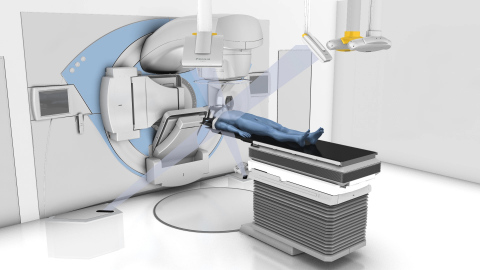BRISBANE, Australia--(BUSINESS WIRE)--Princess Alexandra Hospital is the first center in Australia to install ETX 6.0 Patient Positioning System by Brainlab for radiosurgery treatments on an Elekta linear accelerator (linac). This pioneering new combination for cancer management enables Princess Alexandra clinicians to provide cancer patients with accurate and comfortable treatments.
“Brainlab ExacTrac brings unique benefits to our program,” explains Matthew Foote, MD, Cancer Services Department of Radiation Oncology. “The compatibility of the Brainlab and Elekta systems allows us to offer an expanded treatment spectrum.”
Brainlab has refined and revolutionised precise patient alignment in stereotactic treatments for more than two decades. Precision is deeply embedded in all of the many facets of ExacTrac Patient Positioning -- from refined installation procedures and ever-developing customer training to a vital network of experienced users. With over 500 systems installed around the world and over a million frameless treatments performed, ExacTrac offers accurate 6D patient alignment and precise patient setup.
"We are pleased to add this new treatment paradigm to our portfolio as it meets one of the core Brainlab business tenets to increase worldwide access to less invasive, high-precision treatment methods," explains Phil Cardamone, President of Asia Pacific at Brainlab. "Clinicians and facilities such as Princess Alexandra now have the option to select solutions that are perfectly suited to their operating procedures and the welfare requirements of their patients."
“Our ability to combine premium products from our partners, Brainlab and Elekta, simplifies our processes and enables high treatment precision for many different radiosurgery patients,” says Bryan Burmeister, Director, Cancer Services Department of Radiation Oncology. “The ExacTrac positioning system and Elekta Axesse™ linac with Beam Modulator™ beam-shaping solution complement each other very well, offer dedicated stereotactic radiosurgery (SRS) treatment planning, and more accurate patient positioning during treatment.”
About Princess Alexandra Hospital
Princess Alexandra Hospital (PAH) is one of three tertiary level facilities in Queensland, providing care in all major adult specialties, with the exception of obstetrics. It is one of Australia’s leading academic and research health centres.
PAH Services
The PAH provides acute medical, surgical, mental health, cancer, rehabilitation and allied health services as well as state-wide services - including the Acquired Brain Injury Outreach Service, Queensland Amputee Limb Service, Spinal Outreach Team and the Transitional Rehabilitation Program.
The PAH is nationally recognised for its expertise in trauma management and is a major transplantation centre for livers, kidneys, bone, cartilage, and corneas.
Ancillary services include pastoral care, hospital auxiliary and volunteer services. The hospital has responsibility for the management of the Queensland Liver Transplant Service, Queensland Eye Bank and the Queensland Bone Bank. It also houses one of the major Pathology Queensland laboratories.
Health Research
The PAH plays a lead role in medical research, undertaking research programs with affiliated universities. The hospital is one of eight partners in Queensland's first academic health sciences centre, Diamantina Health Partners. The PA Research Foundation, which is situated on the hospital campus, is dedicated to fundraising to support PAH research activities.
About Brainlab
Brainlab develops, manufactures and markets software-driven medical technology, enabling access to improved, more efficient, less-invasive patient treatments.
Core products revolve around less invasive image guided surgery technology, more accurate and effective radiation therapy, and integration through planning and collaboration systems that bring patient data and physicians together.
Brainlab technology currently powers treatments in the fields of neurosurgery, radiation oncology, orthopedics, ENT, CMF, spine, and trauma.
Privately held since its formation in Munich, Germany in 1989, Brainlab has more than 5,000 systems installed in about 80 countries. Brainlab employs 1,120 people in 17 offices worldwide, including 290 Research & Development engineers, who form a crucial part of the product development team.
To learn more, visit www.brainlab.com.




